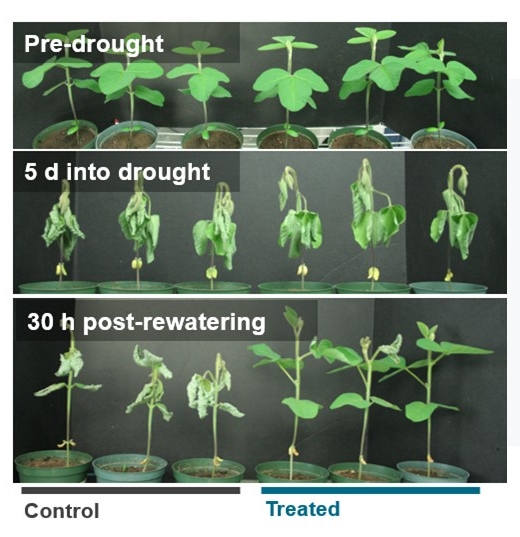Digging Deeper Into Soil Health: Why It Matters and How to Optimize It
As global agricultural demand continues to rise, farmers are challenged to produce more with fewer resources. To meet these demands, the focus is shifting towards understanding and improving the foundation of agricultural productivity: soil health. In a recent webinar, “Digging Deeper into Soil Health: Why It Matters and How to Optimize It,” Acadian Plant Health explored this topic in detail.

Dr. Holly Little
Dr. Holly Little, Director of Research and Development at Acadian Plant Health, explained how biostimulants can play a crucial role in optimizing soil health and enhancing crop productivity.
Soil health, as defined by the USDA, is the continued capacity of soil to function as a vital living ecosystem that sustains plants, animals, and humans. “Healthy soils are characterized by good aggregation, high organic matter content, sufficient rooting depth, proper water storage and drainage, diverse microorganisms, and resistance to degradation,” Little says. “These qualities contribute to improved crop resilience, higher yields, and increased profitability for farmers.”
Little says multiple studies across various crops, from soybeans to walnuts, have shown improved crop resilience to extreme weather, reduced input costs, and net increases in farm income after implementing soil health practices.
The Soil Health Institute has identified three key indicators for measuring soil health:
- Organic carbon concentration: Important for nutrient cycling, retention, and water-holding capacity.
- Carbon mineralization potential: Represents microbial activity and biomass in the soil.
- Aggregate stability: Crucial for erosion resistance, water infiltration, and maintaining soil structure.
Biostimulant Benefits
Biostimulants, such as those developed by Acadian Plant Health using Ascophyllum nodosum seaweed extracts, can positively impact these soil health indicators through various mechanisms:

Comparison of plants treated with Acadian Plant Health’s Ascophyllum nodosum Extract (right) and untreated controls. Both sets of plants were subjected to five days of drought and then rewatered. The bottom photograph is 30 hours after rewatering.
Improved Root Growth: Acadian’s biostimulants contain compounds that enhance root growth, particularly during stress conditions. This increased root mass contributes to organic matter in the soil and improves nutrient and water uptake.
Enhanced Microbial Activity: Acadian’s biostimulants stimulate soil respiration, indicating increased microbial abundance and activity. This leads to improved nutrient cycling, disease suppression, and enhanced plant stress tolerance.
Increased Soil Aggregation: Studies have shown that seaweed extract-based biostimulants can increase the percentage of water-stable soil aggregates over time, improving soil structure and water retention.
Support for Beneficial Microorganisms: Acadian’s biostimulants have been shown to enhance nodulation in legumes by stimulating Rhizobium bacteria, leading to improved nitrogen fixation and nutrient utilization.
Stress Tolerance: During drought conditions, plants treated with biostimulants showed better recovery and maintained higher soil microbial activity than untreated plants.
The benefits of using biostimulants for soil health extend beyond immediate crop productivity. By improving soil structure, increasing organic matter, and enhancing microbial activity, these products contribute to long-term soil sustainability and resilience.
Farmers implementing soil health practices, including the use of biostimulants, have reported significant economic benefits. The Soil Health Institute found that 88% of soybean growers experienced increased net income, with an average increase of $45 per acre. Similar results were observed in corn and specialty crops, demonstrating the wide-ranging applicability of soil health practices.
As agriculture faces increasing challenges from unpredictable weather, resource limitations, and growing food demand, focusing on soil health becomes crucial. Biostimulants offer a sustainable approach to enhancing soil health, complementing other practices such as no-till farming and cover cropping.
Little emphasizes that different biostimulants can affect soil and plant health differently. Therefore, it’s essential to understand individual products’ specific properties and modes of action to maximize their benefits in different agricultural systems.
“Optimizing soil health through biostimulants and other sustainable practices is key to meeting future agricultural demands,” Little says. “Acadian Plant Health biostimulants have been shown to increase microbial abundance and activity, which supports rhizosphere and microbiome establishment. By improving soil structure, enhancing microbial activity, and increasing plant resilience, farmers can build a strong foundation for long-term productivity and profitability while contributing to more sustainable agricultural systems.”
If you missed the live broadcast of this webinar, “Digging Deeper into Soil Health: Why it Matters & How to Optimize it” you can view the archived version online here or visit CropLife.com/webinars and check it out today.
